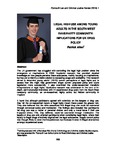Legal High Use among Young Adults in the South-West Rave/Party Community: Implications for UK Drug Policy
| dc.contributor.author | Allen, Patrick | |
| dc.date.accessioned | 2017-04-03T09:04:28Z | |
| dc.date.accessioned | 2017-04-11T11:37:24Z | |
| dc.date.available | 2017-04-03T09:04:28Z | |
| dc.date.available | 2017-04-11T11:37:24Z | |
| dc.date.issued | 2016 | |
| dc.identifier.citation |
Allen, P. (2016) 'Legal High Use among Young Adults in the South-West Rave/Party Community: Implications for UK Drug Policy', Plymouth Law and Criminal Justice Review, 8, pp. 283-309. Available at: https://pearl.plymouth.ac.uk/handle/10026.1/9034 | en_US |
| dc.identifier.issn | 2054-149X | |
| dc.identifier.uri | http://hdl.handle.net/10026.1/9034 | |
| dc.description.abstract |
The UK government has struggled with controlling the legal high problem since the emergence of mephedrone in 2009. Academic research has provided detailed knowledge on how people perceive these substances, mainly focusing on mephedrone, but has yet to identify a viable solution to escalating usage and availability. This research aimed to determine young adults’ (18-26) current perceptions of legal highs and to assess how this might help government shape current proposed policy and futurelegislation more successfully. It also examined the under-researched moralistic interpretations of legal highs. Qualitative research was undertaken in the form of in-depth, semi-structured interviews with 14 experienced drug users from the South-West rave/party community, an un-researched, highly active, but hidden community in England. It found that although participants agreed with scientists on the dangers of drug use, they felt the un-researched nature of legal highs meant these posed the greater risk. They also believed that the risks associated with illegal drug use could be countered through contextual safety and moderation. The findings also revealed that participants felt drug use was a matter of personal choice, and only a moral issue if their use impacted others. This, they believed, could be countered through moderation. The legality of drug use only affected participants when considering legal highs, where their loyalty to illegal drugs effectively stigmatized the legal substances. Supply control policy was thought likely to deter the inexperienced, but increase interest in illegal alternatives amongst experienced users. The implications were that, although current proposed supply reduction legislation has been shown to be effective, it is unlikely to impact the drug habits of the South-West rave/party community. Having found that participants were moral individuals with their own measures in place to protect the community from their drug use, this research recommended a policy of decriminalization. However, it noted implementation difficulties in the politically charged atmosphere that dominates policy-making. | en_US |
| dc.language.iso | en | en_US |
| dc.publisher | University of Plymouth | |
| dc.rights | Attribution 4.0 International (CC BY 4.0) | * |
| dc.rights.uri | https://creativecommons.org/licenses/by/4.0/ | * |
| dc.subject | Legal highs | en_US |
| dc.subject | new psychoactive substances | en_US |
| dc.subject | drug legislation | en_US |
| dc.subject | rave subculture | en_US |
| dc.subject | drug use morality | en_US |
| dc.title | Legal High Use among Young Adults in the South-West Rave/Party Community: Implications for UK Drug Policy | en_US |
| dc.type | Article | en_US |
| dc.type | Article | |
| plymouth.volume | 8 | |
| plymouth.journal | The Plymouth Law & Criminal Justice Review |



